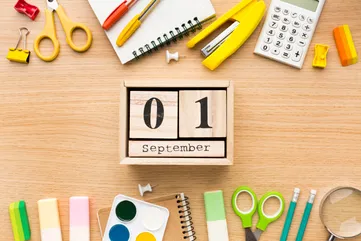Organizational Effectiveness
Organizational effectiveness is the ability to create and maintain systems that maximize productivity and goal achievement while minimizing wasted time, effort, and stress.
Why most teen systems fail
Teens often create elaborate organizational systems that collapse within days. The problem isn't motivation but understanding what makes systems sustainable.
Common system failures:
• Too complex to maintain during stress
• Require perfect execution always
• Don't account for energy fluctuations
• Ignore natural tendencies
• Copy others' systems without adaptation
• All-or-nothing approaches
Effective organization works with your teen's brain, schedule, and energy patterns, not against them.
You're not alone
If your teen's backpack looks like a paper explosion despite multiple organization attempts, or they create beautiful planners they never use, you're witnessing typical adolescent organizational challenges. Research shows only 23 percent of teens have effective organizational systems. Most need explicit teaching and experimentation to find what works. The key is simple, flexible systems that survive real life.
What it looks like day to day
Student
Your teen spends Sunday creating an elaborate color-coded study schedule that's abandoned by Tuesday when reality doesn't match the plan.
Parent
You buy yet another planner or organizational tool, hoping this one will stick, only to find it unused within weeks.
Tiny steps to try
- 1
Minimum viable system
Start with the simplest possible system. One folder for homework. Build complexity only after basics are habitual.
- 2
Energy-based planning
Schedule hard tasks during natural energy peaks. Work with biological rhythms, not against them.
- 3
Capture points
Create specific places for everything to land. One homework spot, one place for forms, one charging station.
- 4
Weekly resets
Sunday evening, reset all systems to baseline. Perfection isn't required; weekly recovery is.
- 5
Flexibility rules
Build in "good enough" alternatives. If the full system fails, what's the backup that prevents total chaos?
Why this skill compounds
Organizational effectiveness creates time, reduces stress, and enables achievement. It's a multiplier skill that enhances everything else.
Research in productivity shows that effective organization can save 1-2 hours daily and reduce stress by 40 percent. These systems become more crucial in college and careers where external structure decreases.
Ready to help your teen thrive?
Get personalized 1-on-1 coaching to build better habits and boost grades. Join 10,000+ families who trust Coachbit.
Frequently Asked Questions
Should I organize for my teen or make them do it?
Start with collaborative organization, gradually transferring ownership. Do it together first, then supervise, then let them lead with check-ins. Full independence usually comes in college. Organizing for them teaches nothing; abandoning them to figure it out alone creates overwhelm. Scaffolded support builds skills.
What if my teen resists all organizational systems?
Resistance often means previous systems felt imposed or unrealistic. Involve your teen in creating their own system, even if it's unconventional. A weird system that works beats a perfect system unused. Start with their biggest pain point and solve that first. Success with one area builds openness to organizing others.
Related Terms
Executive Function
Executive function is your brain's management system that helps teens plan, focus, remember instructions, and juggle multiple tasks successfully.
Mental Organization
Mental organization is the ability to create and maintain internal systems for categorizing, prioritizing, and retrieving thoughts, ideas, and information efficiently.
Physical Organization
Physical organization is the ability to create and maintain orderly systems for belongings, spaces, and materials in ways that support daily functioning and goal achievement.
Productivity
Productivity is the ability to efficiently accomplish meaningful tasks and goals while maintaining balance and avoiding burnout through effective systems and energy management.
Time Management
Time management is the ability to plan, prioritize, and use time effectively to accomplish tasks and meet deadlines without constant crisis.
Related Articles

Finding Order in the Chaos – Setting up Calendars for Kids
Creating a calendar and daily schedule for kids can be beneficial to manage school, homework, extracurriculars and hobbies. Color-coding and time-blocking are helpful tools for kids with ADHD.
Read article
3 Ways an Executive Functioning Coach Can Help Your Child
Discover why executive functioning skills are crucial for your child's success. Learn how an executive functioning coach can make a difference
Read article
